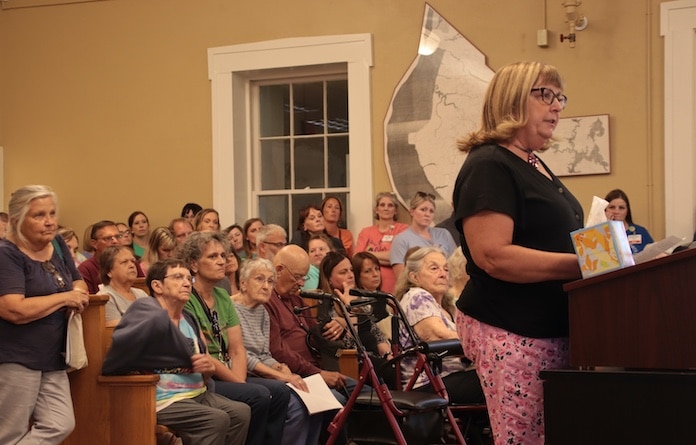Heated meeting over Oak Hill’s future

A busload of Oak Hill residents, dozens of current and former employees, an overflowing, standing room only crowd and over two hours of public comment were not enough to prevent a proposed lease of the county-owned senior living and rehabilitation center from moving forward Tuesday night.
At the conclusion of the meeting, commissioners unanimously approved a measure for Monroe County Board Chairman George Green to authorize a five-year lease agreement with Accolade Healthcare to take over operations at Oak Hill in Waterloo.
As part of the agreement, if both parties agree to extend the lease, a referendum question will be placed on a ballot in either 2030 or 2032 asking voters whether or not the county should sell the facility operations and property for $14 million.
If Tuesday night’s public comment portion of the meeting – lasting just over two hours and fiercely against the lease or sale of Oak Hill – is to be a gauge of voter opinion, that referendum would likely fail.
Monroe County State’s Attorney Ryan Webb began the meeting with an explanation of common misconceptions about Oak Hill, the proposed lease and reasons county officials began exploring lease options.
Webb explained the county was notified of possible Medicare billing issues at Oak Hill in February 2023.
Commissioners then hired and retained accounting and consulting firm Armanino LLP of St. Louis to conduct a “forensic audit” of Oak Hill’s accounting practices from 2016 through 2022.
While the audit is still ongoing, the current bill of just over $265,000 does not include possible Medicare reimbursement, potential fines or fees or the cost of outside counsel needed to handle the matter, Webb said.
Part of the findings, Webb continued, included a recommendation of a governing board of five to nine healthcare industry experts paid for their services, additional human resources personnel, an addition of “significant resources” to the payroll and billing departments and “at least one full-time attorney” dedicated solely to issues at Oak Hill.
“It’s a mini hospital requiring constant oversight,” Webb summarized.
Further economic considerations include Oak Hill being a “danger” to the insurance pools which increases premiums for all county employees in addition to the previously reported staffing challenges, staffing agency costs, rising industry wages and administrative turnover.
He continued by noting Accolade, as a managing company of multiple facilities, is in a better position to provide staffing solutions and oversight of regulatory requirements which have become a high-demand responsibility following the COVID-19 pandemic and related policy implementation.
Part of the fallout of the COVID era, skilled-care senior facilities generally, and Oak Hill specifically, saw a “steep decline in profitability,” Webb said.
While many privately owned nursing homes – Oak Hill being one of the few remaining county-owned facilities in the state – were consolidated or absorbed by larger companies, Oak Hill remained a single entity while still facing “the same regulations without the needed support,” Webb concluded.
Accolade Healthcare President Moe Freedman also gave a short message, urging attendees to not rely on online reviews to tell the whole story and promising “no plans for drastic change” at Oak Hill.
In response to several questions about some of Accolade’s facilities only being rated as “one star” by the Center for Medicare and Medicare Services, Freedman explained that just as four-star ratings are not earned overnight, the facility in question was acquired two years ago, and it will take at least three years for ratings to adjust significantly.
Freedman later confirmed his own mother is currently a resident in one of the one-star facilities in question.
While many speakers accepted the county’s consideration of the effects of COVID, industry-wide staffing shortages in the nursing field and a general mismanagement of Oak Hill in the past several years, repeated questions and comments about the commissioners’ seeming lack of transparency regarding the lease process and alleged indifference to Oak Hill affairs dominated comments from the public.
Many speakers – including retired Oak Hill staff development coordinator Pat Felix – questioned the purpose of the meeting in the first place, as the process to finalize the lease seemed to be a foregone conclusion.
“Is there a point to all this?” Felix asked, adding she understood lease approval was a “done deal.”
When told the potential sale is “still in the voters’ hands,” Felix responded by asking, “Why don’t we vote on the lease?”
Another former longtime Oak Hill employee, Donna DeWilde, who served as director of nursing, asked why there was not more oversight of Oak Hill in the past and why the public was not made aware of financial difficulties until recently.
“We see it in the newspaper, and we’re hearing Oak Hill makes money, but then only recently was it reported that there were problems,” DeWilde said, then asking why the performance of Oak Hill was not discussed as it was happening.
A prior speaker also noted she thought it was strange the lease and Oak Hill’s financial woes “just popped up in the newspaper,” while another found it “odd” the lease would be approved shortly after the 20-year Oak Hill construction bond was paid off earlier this year.
Several other speakers requested the board postpone the lease authorization vote, and many questioned why the Oak Hill Advisory Board – created to address pressing issues at the county-owned nursing facility – was not reinstated following its dissolution during the COVID pandemic.
Zoe Weakly, another former employee who began at what is now Oak Hill in 1979, was also at one time an advisory board member.
She asked where the lease funds – $750,000 the first year – are going.
Webb stated this money would be put in the county’s general fund, later adding there is no mechanism in the lease to allow the county to finance maintenance at the facility.
He also clarified the Monroe County Nursing Home (Oak Hill) Endowment Board would continue operations as usual.
Weakly also pointed out former commissioners handled the problems of Oak Hill rather than finding a way to get rid of them.
She also asked why a management company solution similar to the one used in the late 1990s through the early 2000s was not utilized.
Weakly continued by reiterating the lack of proper administrative staff vetting in the recent past, pointing out Alicia Emmerich was an LPN who was not qualified to administrate, and Emmerich was “set up to fail.”
Weakly concluded by saying signing the authorization would be an “epic fail for your county board and your legacy.”
Susan Unterseh, whose grandfather Fred H. Meister was a county commissioner in 1951 when the county first entered the senior care arena, asked an oft-repeated question of the current board’s diligence in finding a “competent administrator” in the past five years.
Unterseh also said “Oak Hill is the strength of its people” and her father’s “legacy,” urging commissioners not to “take the easy way out.”
Former county commissioner Delbert Wittenauer expressed his displeasure on Facebook following the lease announcement earlier this month.
“I assumed this would happen some day when people elected to take care of (Oak Hill) would not be willing to put the time and commitment into a county service the taxpayers voted in!” he posted Aug. 12.
Wittenauer spoke with the Republic-Times Tuesday afternoon, saying he was “really frustrated” by the move, adding it “can be a success” if there were more time and energy dedicated to Oak Hill’s success.
“Scrapping it is not the way to go,” he continued. “We were so proud of the (Evergreen Pointe) rehab center. It was a dream come true,” referring to the Oak Hill extension paid for without the need for another referendum.
He credited former administrator Kim Keckritz for running a “tight ship” during his tenure, also speculating nursing home care in the region will suffer if Oak Hill is no longer the standard.
“Oak Hill makes competition better,” he continued, saying it was “probably number one in the state at its best,” which made other area facilities try to improve.
During Tuesday night’s meeting, Pam Muertz called Oak Hill a “community investment” and questioned how the county could maintain its proposed oversight while the lease was in place.
Green explained there will be quarterly meetings with Accolade officials to monitor quality measures at Oak Hill in addition to safeguards in the event of a drastic reduction in care.
Muertz also questioned why the lease was “rushed through,” speculating the board knew a public vote on the matter would fail.
“A need is recognized, and a larger jail is approved, but Oak Hill doesn’t seem to be a priority,” Muertz continued, urging commissioners to “reconsider before it’s too late.”
Lonnie Ludwig, whose mother has been in the three wings at Oak Hill over the past nine years – assisted living, skilled care and memory care – said he “couldn’t ask for better care,” adding, “Don’t mess it up.”
The first to speak during public comment was frequent county board meeting attendee Pat Kelly, who began by reminding commissioners he and others have paid taxes for decades in support of the Monroe County Nursing Home, now known as Oak Hill.
He also asked commissioners why the recently-hired administration staffing group was not given a chance and why the board was in “such a hurry” to lease Oak Hill – especially with the facility being “voter-supported time after time.”
Next up was Carol Muench, who chastised commissioners for making the decision “in a vacuum without soliciting any community input to plan and orchestrate the dismantling of the county-owned nursing public forum.”
She suggested a “path forward could have been considered and assessed through collaboration with the community,” but stated commissioners “independently, out of convenience, fatigue and frustration, decided to make decisions that are life altering.”
While it was stated several times that current Oak Hill residents would notice little differences once Accolade assumed operations, a group of current Oak Hill employees posed questions about their employment security and loss of critical benefits.
Litney Hick, who has been with Oak Hill for 14.5 years, asked Freedman to “give our employees answers,” saying the employees are “not at our best” due to the uncertainty caused by the lease announcement.
Freedman apologized for the lack of a smooth “rollout,” but promised all current vacation time will be held.
“At the end of the day, it doesn’t benefit Accolade to have (Oak Hill employees) unhappy,” Freedman said, promising to “be here” for Monroe County in person and with the Accolade team he trusts.
Several other employees, including Camille Donjon, asked about Oak Hill employees’ Illinois Municipal Retirement Fund status, a question Monroe County Clerk Jonathan McLean answered by stating employees would no longer be county employees once the lease was finalized, and would therefore no longer be eligible for IMRF benefits, much to the chagrin of the audience.
Freedman explained Accolade offers alternative retirement plan options, later stating that no positions would be “eliminated, but adjusted.”
Donjon continued by reminding the crowd that Oak Hill staff are “taking care of their prized possessions,” meaning family members.
She then offered a pointed criticism of board members, saying, “You lied to me” during recent union negotiations while knowing a lease proposal was pending.
Once the public comment was wrapped up, Monroe County Commissioner Doug Garmer offered some consolation.
“There’s a lot of passion in the room,” Garmer noted, adding the situation “needs to be addressed sooner than later” and that commissioners are “trying to do the right thing.”
Garmer then made a motion to authorize Green to sign a lease agreement, and the board unanimously approved the motion.
The next step in the process is acquiring approval of the “operational transfer” by the Illinois Health Facilities and Services Review Board.
Public comment is now being accepted. Read the notice of review and opportunity for public hearing and written comment on page 1C of this issue.
If the lease is finalized, Oak Hill and its properties will continue to be owned by Monroe County, although any potential legal liabilities would fall on Accolade.
Approval of a future referendum question would sever any existing ownership ties between Monroe County and Oak Hill.






